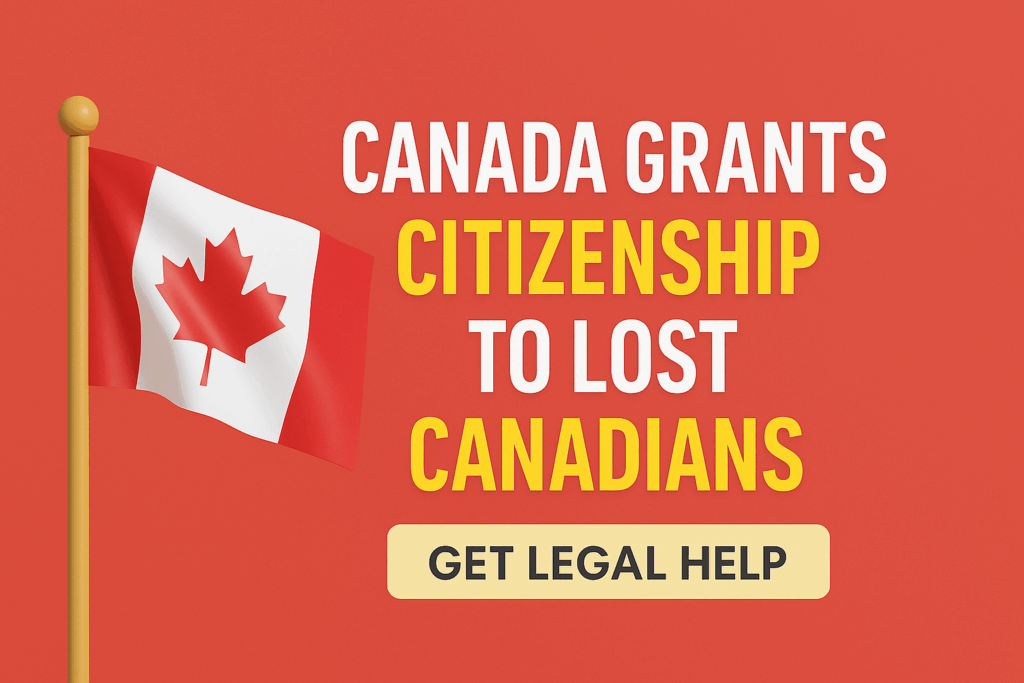A long fight. A long wait. But finally a breakthrough.
On the heels of mounting legal pressure and public outcry, Canada has introduced new interim measures to help “Lost Canadians children denied citizenship due to the controversial first-generation limit (FGL). First generation Canadian citizenship

These updates, announced by Immigration, Refugees and Citizenship Canada (IRCC), offer discretionary citizenship grants and priority processing to families that have waited far too long for justice.
Let’s unpack what this means and why it’s such a historic step forward.
The First generation Canadian citizenship
Lost Canadians” refer to individuals who, despite having deep family ties to Canada, were denied citizenship due to outdated and discriminatory rules—specifically the first-generation limit.
You’re born abroad. Your parent is Canadian. But because they were also born abroad, you’re not considered Canadian even though your bloodline, values, and identity are Canadian through and through.
The result?
Thousands of children grew up stateless or without access to the country their families belonged to.
What Is the First generation Canadian citizenshipn Limit (FGL)?
Introduced in 2009, the FGL is a clause in the Citizenship Act that prevents Canadian citizens born abroad from passing on citizenship to their children if those children are also born outside Canada.
So even if you’re a proud Canadian by descent, your child might not be.
This created two tiers of citizenship, violating core principles of equality and human rights.
In 2023, the courts called it out declaring the FGL unconstitutional.
And now, for the first time, IRCC is doing something about it.
Canada’s Response: Discretionary Citizenship Measures
In response to legal rulings and societal pressure, IRCC has implemented new temporary measures to restore justice for lost Canadians.
What’s Included:
Discretionary citizenship grants under Section 5(4) of the Citizenship Act
Priority processing of applications related to the FGL
Individual case assessments for families facing legal limbo due to the law
Who Can Apply? First generation Canadian citizenship
Anyone who:
Was denied citizenship due to the first-generation limit
Is the child of a Canadian citizen by descent
Was born outside Canada and does not qualify automatically
Note: These measures are not automatic. Each case will be reviewed carefully and applicants may need to demonstrate ties to Canada.
Why This Still Isn’t a Full Fix
Let’s be clear this is a major step, but it’s not the final one.
These measures are interim.
The first-generation limit is still part of Canadian law, and Bill C-71, which aimed to amend it, has still not been passed.
What Canada needs now is:
Permanent legislative reform
Automatic restoration of rights
A clear end to discriminatory barriers in citizenship law
Until that happens, families will still have to petition, prove, and plead instead of being protected by birthright.
Voices of the Affected: “We Never Gave Up”
Parents, immigration advocates, and lawyers across Canada have long called for these changes.
One Toronto-based immigration lawyer said:
This is justice delayed, but not denied. Canada is finally acknowledging these families but we must keep pushing for permanent change.”
For families who fought for years, the announcement brings both relief and rage relief that something is finally being done, and rage that it took this long.
What Should You Do If You’re Affected?
If you or your child has been impacted by the FGL, now is the time to act.
Step-by-Step:
Check eligibility under the new IRCC interim measures
Gather documents proving parent’s Canadian status and your relationship
Apply for a discretionary grant of citizenship (Section 5(4))
Consult with a Canadian immigration lawyer to strengthen your case
These applications are complex. Having legal support ensures your application is handled with clarity, evidence, and urgency.
Canada’s Global Image Is on the Line
Canada has long claimed to be a champion of equality, diversity, and fairness.
But this law this one, specific limitation has silently excluded thousands of children from calling Canada home.
The new IRCC measures are a hopeful gesture, but they also serve as a reminder:
A country’s values are not just written in policy they’re reflected in how it treats its people.
A Law Must Not Divide Families
No child should ever be less Canadian than their parent simply because of where they were born.
This announcement is a turning point, but the fight for equal citizenship isn’t over.
Until the First generation Canadian citizenship limit is repealed completely, the mission remains:
Every Canadian family deserves a united, recognized, and protected identity.
First generation Canadian citizenship First generation Canadian citizenship First generation Canadian citizenship
